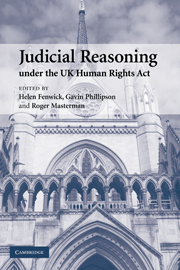Book contents
Foreword
Published online by Cambridge University Press: 30 October 2009
Summary
In his celebrated work, On Liberty, John Stuart Mill commented:
There is a limit to the legitimate interference of collective opinion with individual independence; and to find that limit, and maintain it against encroachment, is as indispensable to a good condition of human affairs as protection against political despotism.
But finding that limit, striking the balance between the public interest and individual rights, remains as difficult and elusive today as it was in 1859. It is an exercise which lies at the heart of much of our contemporary discussion and litigation arising from the incorporation into domestic law of the European Convention on Human Rights. Nearly six years after the Human Rights Act 1998 came into force, the courts are still grappling with some fundamental issues. For example, when is it for the court to decide for itself whether there would be a breach of one of the Articles, as opposed to deciding whether some other body's decision on that issue was a proper one, with which the court will not interfere? It is inevitable that, when legal rights are expressed in such general terms as one finds in the Articles of the European Convention on Human Rights, there will be much room for differences of opinion as to the application of those rights.
- Type
- Chapter
- Information
- Judicial Reasoning under the UK Human Rights Act , pp. ix - xPublisher: Cambridge University PressPrint publication year: 2007



